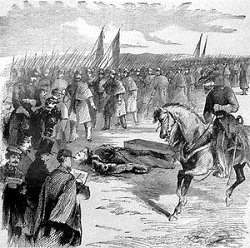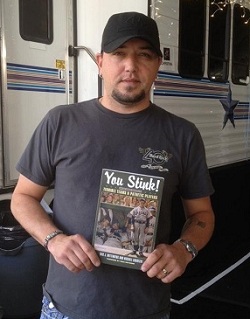150 years ago this week...
This week marks the 150th anniversary of The Battle of Fredericksburg. As a Fredericksburg resident and local historian, I have had the pleasure of writing several books, dozens of articles and blog posts, four lectures, and multiple tours presenting the tragic events of December 11-15 of 1862. Of all the projects that I have been involved in, none has given me a greater sense of pride and purpose than this one…
Visit the movie's website at http://www.theangelmovie.com/, the Facebook page at: https://www.facebook.com/theangelmovie and purchase the DVD here.
(And here is a BONUS associated lecture that I presented on the 123rd PA Volunteers who may have recieved aid from Richard Kirkland on that fateful day.)
Every Civil War writer has quoted either Union General William T. Sherman's statement of "War is all Hell," or the Confederacy's supreme commander, Robert E. Lee, when he said "It is well that war is so terrible-lest we should grow too fond of it." Both of these men were among the greatest generals ever to set foot on a battlefield, yet their obvious distaste for the very acts that made them legendary resonates from these lines. As a historian, one must always be careful not to "over-romanticize" war and to be constantly aware of the cold, sometimes harsh realities of the people and times that they portray. This is a dilemma that has plagued military critics for centuries, resulting in both revisionist and apologist histories being written again and again.
However, for every heartbreak in wartime there has also been heroism, and for every tragedy, there has also been triumph. This is what makes the history of warfare worthy of our attention and justifies the energy we spend to preserve its memory for future generations. It is the good stories, the ones that reflect life (not death), the ones founded on courage and mercy that demand our interest. This is the side of war that truly needs to be commemorated as it reminds us all what it means to be human.
One such incident is the story of Sergeant Richard Rowland Kirkland, otherwise known as "The Angel of Marye's Heights." Perhaps remembered as the most compassionate and heroic character in Civil War memory, this lone Confederate soldier's conduct has become one of the most touching and inspirational subjects ever to come out of the War Between the States.
By the winter of 1862, Gen. Robert E. Lee's forces had claimed several key battlefields in the Eastern Campaign. One of the biggest and most "one-sided" southern victories took place during the Battle of Fredericksburg. In retrospect, the term slaughter would perhaps be more appropriate for this affair. Early in the morning on December 13, 1862, Union forces began a desperate and doomed assault on a fortified position, known today as the "stone wall at the sunken road."
After crossing the Rappahannock River and taking possession of Fredericksburg, the Federal Army of the Potomac set its sights on taking the surrounding area where the Army of Northern Virginia had withdrawn. Perhaps a little too confident after experiencing only minor skirmishes in the town, the Union commanders failed to realize the brilliant tactical deployments established by Lee's lieutenants. By intentionally leaving the town to the enemy, Confederate forces were able to fortify their positions in anticipation of the arrival of the Federals. The most impenetrable of these positions was a long stone wall at the base of a sloping hill known as Marye's Heights. Overlooking the field stood another "virtual" wall of Confederate artillery, cavalry and support troops that extended for miles in both directions. An attack would be a suicide mission.
In order to reach the enemy, Union soldiers had to ford a canal ditch and then cross a vast open field with little or no cover. As soon as they left the tree line, a massive artillery barrage, joined by almost uncountable rifle fire, rained down upon the advancing men. Those that were able to escape the cannon were slowed by a slope that led to a fortified stone wall lining a sunken road. Behind the wall, soldiers knelt two and three ranks deep, with the front line firing and the rest reloading musket after musket. The result was a continuous hail of fire that cut rows and rows of men down before they could even get into position.
Wave after wave of Union soldiers left the safety of the canal ditch and were slaughtered. The death toll was staggering. In just one hour the Federals suffered more than 3,000 dead. After fifteen unsuccessful charges, the fighting ceased for the night, leaving the field littered with thousands of bloody bodies. Around midnight, Federal troops ventured forth under cover of darkness to gather what wounded they could find, but many were too close to the Confederate line to retrieve. Throughout the night, screams and cries of the wounded penetrated the peaceful silence of the cease-fire.
A Confederate soldier stationed at the wall later stated that it was "weird, unearthly, terrible to hear and bear the cries of the dying soldiers filling the air -lying crippled on a hillside so many miles from home-breaking the hearts of soldiers on both sides of the battlefield."
One soldier, Richard Rowland Kirkland, an infantry sergeant with the 2nd South Carolina Volunteers, struggled to rest amidst the horrid sounds of suffering that echoed across the field. A combat veteran, he was accustomed to the dead and dying, having seen action at Manassas, Savage Station, Maryland Heights and Antietam. By the morning of the 14th, he could take it no longer and requested permission to aid the enemy.
Initially, his commanding officer General Joseph B. Kershaw was reluctant, as Kirkland would likely be shot dead by Union sharpshooters when he cleared the wall. He later granted the persistent soldier his request, but forbid him to carry a flag of truce. Determined to do the right thing and with total disregard for his own safety, Kirkland grabbed several canteens and leaped over the fortification. Instantly several shots rang out as the Union soldiers thought their wounded were under attack. Realizing the sincerity of Kirkland's effort, the Federal marksmen lowered the barrels of their rifles. Thus, the fatal shot never came and both sides looked on in amazement as the sergeant moved from one wounded man in blue to another. Going back and forth over the wall for an hour and a half, Kirkland only returned to the safety of his own lines after he had done all he could do.
A fellow soldier in Kirkland's company later recalled the incident in part of a short narrative entitled "The Confederate Veteran" that was published in 1903. He wrote, "The enemy saw him and supposing his purpose was to rob the dead and wounded, rained shot and shell upon the brave Samaritan. God took care of him. Soon he lifted the head of one of the wounded enemy, placed the canteen to his lips and cooled his burning thirst. His motivation was then seen and the fire silenced. Shout after shout went up from friend and foe alike in honor of this brave deed."
In the end, this soldier's action resulted in much more than a moment of mercy. It was a moment that stopped the entire Civil War and reminded those around him that, regardless of their circumstances, one should always strive to show compassion for his fellow man.
Kirkland's final fight would come during the bloody battle at Chickamauga. Here he would fall, yet be remembered in the same heroic fashion as he was after Fredericksburg. According to one account:
"In September of 1863, [Sergeant Richard Rowland] Kirkland would find himself fighting in the western theater as a detachment from Lieutenant General [James] Longstreet's Corps moved west to support Confederate General Braxton Bragg's efforts to stop Union Major General William Starke Rosecrans and the Army of the Cumberland. They would do just that during the Battle of Chickamauga, which would produce both a Southern victory and 34,600 casualties. Sadly, the valiant sergeant ranked among those killed during this colossal battle. Mortally wounded in a failed charge, Kirkland exhorted his comrades to, 'Save yourselves' adding 'Tell Pa, I died right.'"
In 1965, a monument was sculpted by the artist Felix DeWeldon and unveiled in front of the stone wall on the Fredericksburg battlefield where Kirkland performed his humanitarian act. The inscription on the statue reads: "At the risk of his life, this American soldier of sublime compassion brought water to his wounded foes at Fredericksburg. The fighting men on both sides of the line called him the Angel of Marye's Heights."
For more, visit GREAT LIVES THAT TOUCHED FREDERICKSBURG DURING THE CIVIL WAR Richard Kirkland, "The Angel of Marye's Heights" by Michael Aubrecht
Posted by ny5/pinstripepress
at 11:45 PM EST
Updated: Saturday, 8 December 2012 12:27 AM EST
Permalink |
Share This Post
Military executions under “Stonewall” Jackson examined
 Tip o’ the hat to Kevin Levin over at Civil War Memory for bringing this to my attention…
Tip o’ the hat to Kevin Levin over at Civil War Memory for bringing this to my attention…
There is an excellent video available online of Peter Carmichael’s talk on military executions under General Thomas “Stonewall” Jackson’s command. In it Carmichael presents the different forms of punishment used under Jackson’s leadership in 1862 and the reactions of Confederate soldiers to these measures. Carmichael is the director of the Civil War Institute at Gettysburg College, and he presented this lecture at the Institute’s 2012 conference. Military execution in the Confederate Army is a neglected subject that has always fascinated me. As a Jackson biographer, I am well aware of “Stonewall’s” reputation as a strict disciplinarian and that he sometimes struck fear in his own troops. I wrote about this very subject in my book on the Civil War in Spotsylvania County (which BTW is now available for the Kindle and all other eReaders. You can purchase a copy for the Kindle (here), the Nook (here), and also as an Apple iBook (here). Here is an excerpt from this book featuring three first-hand accounts:
Crime and Punishment: Executions: Courts-Martial and Humiliations
Excerpt from The Civil War in Spotsylvania County by Michael Aubrecht
"There is some of the orneriest men here that I ever saw and the most swearing and card playing and fitin [fighting] and drunkenness that I ever saw at any place." — new recruit in the Civil War Society’s Encyclopedia of the Civil War
As the war dragged on into its third and fourth years, soldiers on both sides of the conflict began to flee the army in record numbers. Some were traumatized by the horrors they had witnessed, others were shamed by the atrocities they had committed and many more were disenchanted with the inexperienced officers who ultimately hampered their chances at survival. Southern troops were more likely to desert, as their supplies were dwindling at a more rapid rate compared to their Northern counterparts who were better outfitted. According to Dr. James I. Robertson Jr. in his book Tenting Tonight, one in every seven Confederates would eventually desert. As the soldiers fell into a deeper sense of desperation, the futility of their fight and cause became overwhelming at times. One Rebel soldier wrote, “Many of our people at home have become so demoralized that they write to their husbands, sons, and brothers that desertion is now not dishonorable.”
In order to curb a mass exodus from spreading throughout the ranks of the Confederate army, officers were forced to make grim examples of those who were apprehended while attempting to abandon their duty. The odds of successfully escaping were said by some to be three to one in favor of the soldier. Those who were caught, however, were dealt with in a swift and deadly manner. Following a court-martial, deserters would often be sentenced to death by firing squad. These public executions were to be carried out in front of the entire camp in an effort to strike fear in the hearts of future would-be fugitives.
Each prisoner would be given an opportunity for prayer with a camp chaplain or priest and then blindfolded and (hopefully) shot dead in the chest by a group of riflemen who usually had one loaded musket and the rest primed with powder in place of projectiles. This was done to help dispel guilt. Many times the prisoner’s body would be positioned so as to fall right into a coffin. Sometimes, the lack of marksmanship among the firing squad required additional volleys to finish the job. This made the horrific affair all the more difficult to watch, as the additional suffering of a fellow countryman was unbearable.
Less drastic punishments involved the public humiliation of wearing berating signage, being forced to do hard labor, the branding of the letter “D” for deserter or “C” for coward on the soldier’s hand or cheek or simply being drummed out of camp in a reprehensible fashion. In an age when nobility was held in the highest regard, the dishonor one would bring upon himself and his family by running away was usually deterrent enough. However, as the trauma of war destroyed one’s optimism, the risk of death and disgrace became less frightening.
Some Confederate officials were concerned about the negative effect of camp executions on what remained of troop morale. Several states instituted a no-punishment clause for soldiers who willfully returned to their ranks. One governor wrote a public affirmation that stated, “Many of you have, doubtless, remained at home after the expiration date of your furloughs, without the intention to desert the cause of your country, and you have failed to return to your Commands for fear of the penalty to which you may be subjected. Many of you have left your Commands without leave, under the mistaken notion that the highest duty required you to provide sustenance and protection to your families. Some have been prompted to leave by one motive and some by others. Very few, I am persuaded, have left with the intent to abandon the cause of the South. He added, “I am authorized to say that ALL WHO WILL without delay VOLUNTARILY return to their Commands, will receive a lenient and merciful consideration; and that none, who so return within forty days from this date, will have the penalty of death inflicted on them.”
Here are some firsthand accounts:
Letter from Spencer Glasgow Welch, a surgeon in the 13th South Carolina Volunteer Infantry (McGowan’s Brigade), to his wife:
Camp near Rappahannock River Va
March 5, 1863
Edwin Jim Allen and Ben Strother took dinner with me yesterday and I think I gave them a pretty good dinner for camp. We had biscuit, excellent ham, fried potatoes, rice, light bread butter, stewed fruit and sugar. They ate heartily as soldiers always do. Edwin is not suffering from his wound, but on account of it he is privileged to have his baggage hauled. A man was shot near our regiment last Sunday for desertion. It was a very solemn scene. The condemned man was seated on his coffin with his hands tied across his breast. A file of twelve soldiers was brought up to within six feet of him, and at the command, a volley was fired right into his breast. He was hit by but one ball because eleven of the guns were loaded with powder only. This was done so that no man can be certain that he killed him. If he was the thought of it might always be painful to him. I have seen men marched through the camps under guard with boards on their backs, which were labeled “I am a coward,” or “I am a thief,” or “I am a shirker from battle” and I saw one man tied hand and foot astride the neck of a cannon and exposed to view for sixteen hours. These severe punishments seem necessary to preserve discipline.
Spencer Glasgow Welch
Letter from Simeon David of the 14th North Carolina Infantry to his mother and father:
Camp Gregg near Fredericksburg. Va. March 12—1863
My dear parents:
I will avail myself of an opportunity afforded this morning of writing you to inform you of my continued good health and spirits. I left home Feb the 10th Tuesday, and reached Richmond the following Saturday. I stopped over there one week, having some claims collected for the families of deceased soldiers. I reached the regt. on the 21st of Feb. in the best of health, and found our noble company as well. On Sunday the 22nd of February the biggest snow fell that I ever saw, being on an average one foot in depth. It lay on the ground several days, during which the regt. and brigades had some of the finest sport snowballing I ever saw. The weather for the past ten days has been very changeable, though we have had a good deal of good weather. Everything is quiet on both sides of the Rappahannock, except that the Yankees fired a few artillery shots on yesterday morning. We have had no explanation yet. Our regiment is still in winter quarters and would be doing finely if we could get a little beef to eat. The men have eaten beef till they like it so much better than bacon. A beef ’s liver is a very rare dish. Officers have to pay high now for their commissaries, 40 cts per pound for bacon, 20 cts for beef, 8 cts for flour. The Government is issuing plenty of sugar now, but we have done without until we do not care much about it. General Lee has just detailed a general court-martial for our Brigade, for the trial of commissioned officers and capital offences, of which I am appointed Judge Advocate. The court is to be a permanent one for the trial of offences already committed. Our captain Lister is under arrest, under charges preferred by myself, and will probably be tried by that court. We are all looking with a great deal of anxiety to Charleston and Savannah…
Love to all. Your affectionate son.
S.B. David
Account of deserter execution printed in the September 26, 1863 issue of Harper’s Weekly:
The crime of desertion has been one of the greatest drawbacks to our army. If the men who have deserted their flag had but been present on more than one occasion defeat would have been victory, and victory the destruction of the enemy. It may be therefore fairly asserted that desertion is the greatest crime of the soldier, and no punishment too severe for the offense…Some of these had enlisted, pocketed the bounty, and deserted again and again. The sentence of death being so seldom enforced they considered it a safe game. They all suffered terribly mentally, and as they marched to their own funeral they staggered with mortal agony like a drunken man. Through the corps, ranged in hushed masses on the hill-side, the procession moved to a funeral march, the culprits walking each behind his own coffin. On reaching the grave they were, as usual, seated on their coffins; the priests made short prayers; their eyes were bandaged; and with a precision worthy of praise for its humanity, the orders were given and the volley fired which launched them into eternity. They died instantly, although one sat up nearly a minute after the firing; and there is no doubt that their death has had a very salutary influence on discipline.






 Tip o’ the hat to Kevin Levin over at Civil War Memory for bringing this to my attention…
Tip o’ the hat to Kevin Levin over at Civil War Memory for bringing this to my attention… It’s been a really good month for
It’s been a really good month for 
 It’s been a little while since my last post so I thought I would check in…Over the last month I have been dealing with a relapse of serious health issues while being completely absorbed in my latest project with Jason Aldean’s drummer
It’s been a little while since my last post so I thought I would check in…Over the last month I have been dealing with a relapse of serious health issues while being completely absorbed in my latest project with Jason Aldean’s drummer